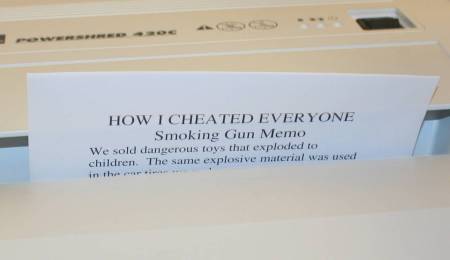The past three years have seen an increase of cases highlighting litigation holds and the duty to preserve electronically stored information. There is no shortage of cases that hold many “lessons learned” for attorneys and their clients.
The Nightmare Litigation Hold Letter

The Napster litigation gave us more then copyright law on music downloads; one case gave us one of the worst litigation hold letters ever:
Hank has asked me to send this out to everyone.
All emails re Napster at this point are related to the litigation and should contain the “a/c” (attorney communications) symbol in the subject line and [REDACTED]@fenwick.com should be ccd. We should not be sending e-mails on this subject anyway. Items from outsiders such as resumes do not require this.
Hank Barry
Please also be aware of our e-mail policy. As we have all been required to surrender Napster e-mails, this should reinforce compliance with our long standing policies.
1. We do not retain e-mails, it is your responsibility to delete your handled e-mails immediately
2. We do not us e-mail to chat about matters related to public companies or matters such as the above
3. We do not retain written copies of e-mails in our files
4. Our document retention policy is that we do not retain documents on any public or acquired company and retain limited information on private companies. all retained information is stored in central files, pls do not retain other docs in your own files unnecessarily
5. We do not retain files separate from our central files which are periodically checked for compliance to policies
Please also review the above policies with any summer associates.
UMG Recordings, Inc. v. Hummer Winblad Venture Partners (In re Napster, Inc. Copyright Litig.), 462 F. Supp. 2d 1060, 1064 (N.D. Cal. 2006).
The above letter could have been read with a wink as a destruction order impersonating a document retention policy. The Court found Hummer’s loss of email evidence amounted to gross negligence. The sanctions included a preclusion order, adverse inference instruction and attorneys’ fees. Moreover, no lawyer wants to see their email address in an opinion for spoliation. See, UMG Recordings, Inc. v. Hummer Winblad Venture Partners (In re Napster, Inc. Copyright Litig.), 462 F. Supp. 2d 1060, 1064 (N.D. Cal. 2006).
The Fawn Hall of Spoliation Cases
For those not familiar with Fawn Hall, she was Oliver North’s secretary who destroyed documents in the Iran-Contra affair. In KCH Servs. v. Vanaire, Inc., 2009 U.S. Dist. LEXIS 62993 (W.D. Ky. July 21, 2009), the soon to be named Defendant was put on notice of a lawsuit because of unlicensed software usage.
In KCH Servs. v. Vanaire, Inc., 2009 U.S. Dist. LEXIS 62993 (W.D. Ky. July 21, 2009), the soon to be named Defendant was put on notice of a lawsuit because of unlicensed software usage.
Instead of enacting a litigation hold, the Defendant ordered the “software deleted immediately” after the telephone call with the future Plaintiff. KCH Servs, 3-4.
The Defendant’s actions deprived the Plaintiff any opportunity to inspect relevant evidence once the lawsuit began.
The Court ordered the spoliation sanction of an adverse inference instruction, instead of a default judgment, for the Defendant’s obstructionism. KCH Servs, 6.
Production of Litigation Hold Letter
 Litigation hold letters are generally not discoverable, because of the attorney-client privilege and the work product doctrine. Major Tours, Inc. v. Colorel, 2009 U.S. Dist. LEXIS 68128, 6-7 (D.N.J. Aug. 4, 2009).
Litigation hold letters are generally not discoverable, because of the attorney-client privilege and the work product doctrine. Major Tours, Inc. v. Colorel, 2009 U.S. Dist. LEXIS 68128, 6-7 (D.N.J. Aug. 4, 2009).
However, a party is entitled to discovery on the categories of electronic storage information an opposing party was instructed to preserve and collect, and the specific actions that were undertaken. Major Tours, Inc., 6-7.
What makes the above a “general” rule is when there has been spoliation, which then can make a litigation hold letter discoverable. Major Tours, Inc., 7.
The Plaintiffs in Major Tours, Inc. v. Colorel were able to make a preliminary showing of spoliation because of some very damaging deposition testimony of two Federal Rule of Civil Procedure Rule 30(b)(6) witnesses (For a great summary of this case, visit John Jablonski’s Court Orders Production of Litigation Hold Letters).
One 30(b)(6) witness testified that he was “probably” told by his attorneys to preserve certain emails, but that he didn’t save anything. Major Tours, Inc., 10. Another witness testified that “no one ever talked to her about creating a litigation hold policy and that she was not sure what a litigation hold policy was.” Major Tours, Inc., 10-11.
The Defendants were ordered to produce different litigation hold letters and identify who received those letters. Major Tours, Inc.,16.
Bow Tie Thoughts on the “Holding Pattern”
A botched litigation hold letter, failed preservation policies or just outright destroying evidence can ruin a client’s case. Needless to say, the damage to a lawyer’s career would also be severe.
Working with clients on a proactive basis to determine document retention/destruction policies and litigation hold procedures can help avoid spoliation cases because of an ineffective litigation hold.
